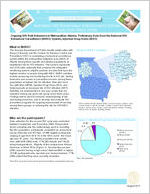The Georgia Department Of Public Health
Fact Sheet
National HIV Behavioral Surveillance System: Injection Drug Users
Ongoing HIV Risk Behaviors in Metropolitan Atlanta: Preliminary Data from the National HIV Behavioral Surveillance (NHBS) System, Injection Drug Users (IDU2)
What is NHBS?
The Georgia Department of Public Health collaborates with Emory University and the Centers for Disease Control and Prevention (CDC) in conducting a behavioral surveillance system within the metropolitan statistical area (MSA) of Atlanta among three specific and distinct populations at heightened risk for HIV infection. This system represents one of 25 sites nationally that comprise the integrated monitoring system; eligible systems are sites that have the highest number of people living with AIDS. NHBS activities include assessing and monitoring trends in HIV risk, testing behaviors and access to preventive services among these populations at highest risk for infection: Men who have Sex with Men (MSM), Injection Drug Users (IDU), and Heterosexuals at increased risk of HIV infection (HET). Activities are implemented in one-year cycles that are repeated among any given risk group every three years. Findings will be used to enhance understanding of risk and testing behaviors, and to develop and evaluate HIV prevention programs for ongoing improvement of services among these groups in reducing this risk for HIV/AIDS infection.
Atlanta MSA Counties
Bartow
Pickens Dawson
Cherokee Forsyth
Paulding Cobb
Gwinnett Barrow
Haralson Carroll
DeKalb
Walton
Douglas Fulton
Rockdale
Clayton
Newton
Fayette Henry
Coweta Heard
Jasper Spaulding Butts
Pike
Lamar Meriwether
*MSA counties: Barrow, Bartow, Butts, Carroll, Cherokee, Clayton, Cobb, Coweta, Dawson, Dekalb, Douglas, Fayette, Forsyth,Fulton, Gwinnett, Haralson, Heard, Henry, Jasper, Lamar, Meriwether, Newton, Paulding, Pickens, Pike, Rockdale, Spalding, Walton
Who are the participants?
Data collection for the second IDU cycle was conducted between September and December 2009. Respondent driven sampling was the methodology used in recruiting the IDU population; participants completed an anonymous survey interview and HIV test. Of 466 eligible participants ranging in age from 19 to 70 in the IDU2 cycle*, the mean age was 47 years. Our Atlanta population was mostly men, with 82% (380) male, 17% (80) female and 1% (6) being transgendered. Majority of the sample were AfricanAmerican or Black IDUs (Figure 1). Seventy-two percent (338) reported having a high school diploma/GED or higher. Of 348 participants who reported ever being homeless, 77% (268) stated that they were currently homeless.
*Note: IDU2 means the second cycle for behavioral surveillance among injection drug users
Figure 1: Injection Drug Users by Race/Ethnicity
0.43 4.3
3.4
17.6
African-Am erican (N=361) White (N=82)
Hispanic (N=16)
77.6
Native American (N=2) Multi-racial (N=20)
Total = 440 participants
2 Peachtree Street, Atlanta, Ga 30303 w www.health.state.ga.us
August 2011
National HIV Behavioral Surveillance System: Injection Drug Users
What are the behaviors of this population? How are IDUs affected by HIV and HCV?
The IDU population reported injecting heroin (60%), combining heroin and powdered cocaine (16%), crack cocaine (15%) and crystal meth (8%).Other issues such as injection paraphernalia sharing was still present among this population, 34% (156) reported sharing syringes and 80% (373)reported sharing other paraphernalia such as cotton, water, and cooker at last use. With regards to examining sharing networks, over two-thirds (69%) reported not knowing their injecting partner's HIV status, about one-third (32%) stated their last injecting partner was MSM and 81% (377) reported not knowing their injecting partner's HCV status. HIV positivity rates among participants in this cycle were 19% (87).
Of the 87, IDUs that were positive for HIV, 49% (43) were aware of being HIV positive at time of test. Thirty-one percent (145) reported ever being told by a physician that they had hepatitis, of that 32% (46) reported having Hepatitis B and 76% (110) reported Hepatitis C. Fiftynine percent (275) reported being tested for HCV. Ninety percent of those aware of their HCV status reported knowing it for a year or longer and 86% (125) of them reported not being given medicine to treat HCV.
What prevention services are IDUs accessing in the Atlanta MSA?
Seventy-two percent (334) of IDUs surveyed reported ever receiving drug/alcohol treatment. Of those that reported ever participating in a drug/alcohol treatment program, only 35% (116) attended one in the last 12 months and 81% (376) stated they were unable to obtain admittance to a program. Forty-three percent (197) have reported participating in a needle exchange program and 56% (261) reported receiving free condoms in the past 12 months.
These findings illustrate potential gaps in services for IDUs receiving HIV and HCV testing as well as alcohol and drug treatment services. Further insight is needed to determine the reasons for the lack of testing with this population and incorporating strategies such as needle-exchange programs in the Atlanta MSA to reduce HIV and HCV risk among the IDU population.
Table 1: HIV & HCV Prevalence of IDUs by Race/Ethnicity
HIV +
HCV +
Race/Ethnicity
N (%)
N (%)
*African-American
63 (72%)
69 (66%)
*White
21 (31%)
21 (20%)
Hispanic
4 (5%)
4 (4%)
*Multi-racial
3 (3%)
7 (7%)
Note: Disease prevalence by exclusive Race categories, % will not sum to 100% HIV and HCV Positive Diagnoses only among population * Non-Hispanic
IDIUD2U2PrPirmimaaryryDDrruugg ooff CChhooiciece
Methampheta mine (Crystal, tina, crank)
8%
Cocaine 15%
Crack Cocaine 1%
Something else 0%
Speedball Heroin and
cocaine 16%
Heroin 60%
Percent (%)
Figure 2: Utilization of Prevention Services among IDUs in the Past 12 Months by Race/
Ethnicity
African-American White Other
100
90
80
70
60
50
40
30
20
10
0
Needle-exchange Drug Treatment Program Received Free Condoms
Program (N=176)
(N=115)
(N=259)
Prevention Services
*Note: Categories not mutually exclusive
For additional information about the NHBS
Jianglan White, MD, MPH, NHBS Principal Investigator (404) 657-2601 | jzwhite@dhr.state.ga.us
Jeffery Todd, MA, NHBS Team Leader (404) 657-2603 | jdtodd@dhr.state.ga.us
